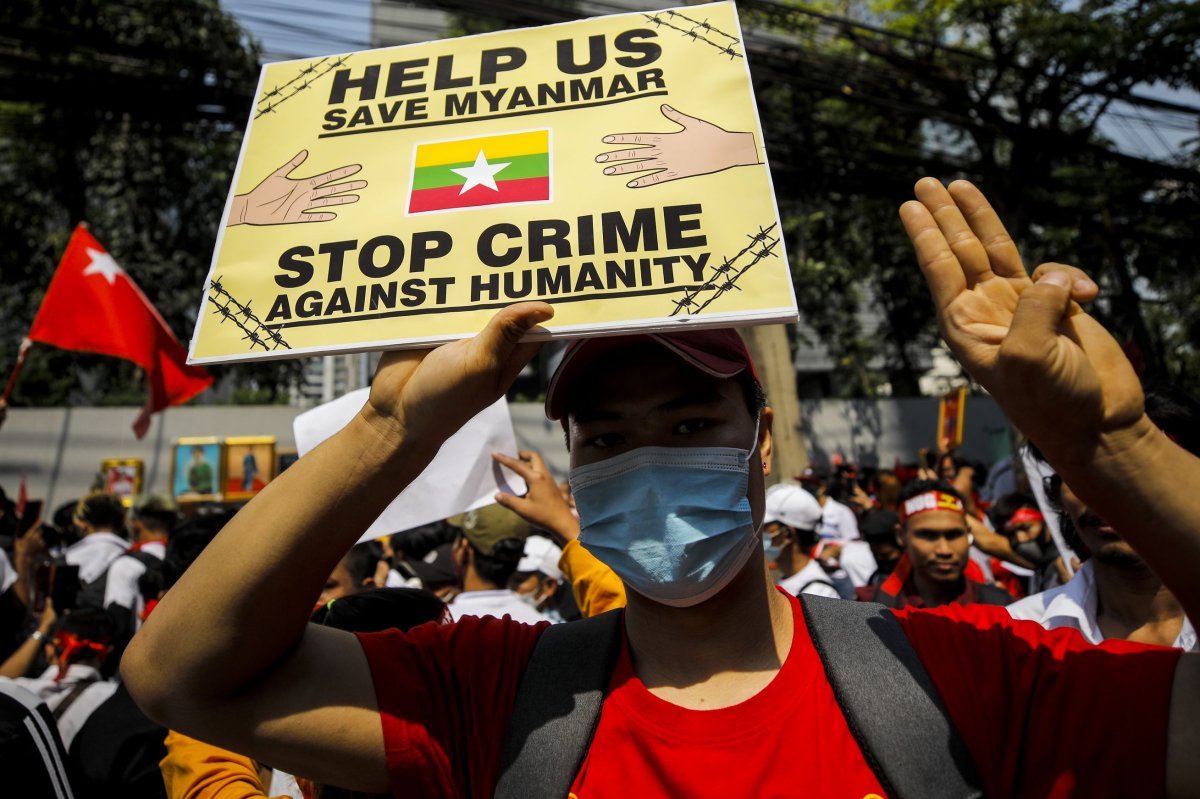UK And Australia's Selective Sanctions Against Myanmar's Junta

Table of Contents
Understanding the Nature of Selective Sanctions
Selective sanctions, unlike comprehensive sanctions targeting an entire nation's economy, focus on specific individuals and entities deemed responsible for human rights violations or supporting the oppressive regime. This targeted approach aims to minimize harm to the civilian population while maximizing pressure on the perpetrators.
Targeting Specific Individuals and Entities
Selective sanctions typically involve:
- Asset freezes: Freezing the assets of designated individuals and entities within the sanctioning country's jurisdiction.
- Travel bans: Prohibiting sanctioned individuals from entering the sanctioning country.
- Trade restrictions: Banning or limiting trade with specific entities or individuals.
Examples of sanctioned individuals include high-ranking military officials, such as Min Aung Hlaing, the leader of the junta, and other key figures in the State Administration Council (SAC). Sanctioned entities often encompass companies linked to the military, involved in the exploitation of natural resources, or providing financial support to the regime. The legal basis for these sanctions typically stems from UN Security Council resolutions or domestic legislation enacted by individual countries. The UK and Australia, for instance, both utilize their own national laws to implement these measures.
The Rationale Behind Selective Sanctions
The strategic goals underpinning selective sanctions against Myanmar include:
- Pressuring the junta: To force a change in behavior and potentially lead to a negotiated political settlement.
- Protecting human rights: To deter further violence and human rights abuses.
- Promoting accountability: To hold those responsible for atrocities accountable for their actions.
- Supporting the democratic movement: To provide support to pro-democracy groups and civil society organizations.
While comprehensive sanctions might appear more impactful, they often inflict significant hardship on the civilian population, undermining the intended goals. Selective sanctions aim to strike a balance, targeting the regime while minimizing collateral damage. However, enforcing these sanctions effectively presents significant challenges, including sanctions evasion and the need for robust international cooperation.
UK's Approach to Myanmar Sanctions
The UK government has actively implemented a range of selective sanctions against the Myanmar military junta.
Key Sanctions Implemented by the UK
The UK utilizes the Global Human Rights Sanctions Regulations 2020 to impose sanctions. This legislation allows for the imposition of asset freezes, travel bans, and trade restrictions on designated individuals and entities. Specific individuals and companies sanctioned by the UK are regularly updated on the UK government website and include high-ranking military officials and businesses linked to the military's financial network.
- Specific legislation: Global Human Rights Sanctions Regulations 2020
- Examples of assets frozen: Details of frozen assets are often not publicly disclosed for security reasons, but the UK government has publicly stated its commitment to pursuing and recovering assets.
- Collaborations: The UK works closely with international partners, including Australia, the EU, and the US, to coordinate sanctions and maximize their impact.
Effectiveness and Challenges of UK Sanctions
Assessing the effectiveness of UK sanctions is complex. While they have undoubtedly placed pressure on the regime, the extent of their impact remains debated.
- Evidence of impact: Some reports suggest sanctions have hampered the regime’s access to international finance, while others argue that the junta has found ways to circumvent them.
- Sanctions evasion: The junta's reliance on informal channels and networks complicates enforcement.
- Improving effectiveness: Greater international cooperation, improved information sharing, and a focus on disrupting the regime's financial networks are crucial to enhance the sanctions' impact.
Australia's Role in Imposing Sanctions on Myanmar
Australia has also taken decisive action by imposing targeted sanctions against individuals and entities linked to the Myanmar military.
Sanctions Regime Implemented by Australia
Australia’s sanctions regime utilizes the Autonomous Sanctions Act 1971 and focuses on asset freezes, travel bans, and trade restrictions on designated individuals and entities. Like the UK, Australia regularly updates its list of sanctioned individuals and entities on its government website. This includes high-ranking military officials and businesses directly involved in supporting the junta.
- Specific legislation: Autonomous Sanctions Act 1971
- Types of sanctions imposed: Asset freezes, travel bans, and trade restrictions.
- Examples of sanctioned individuals and entities: These are publicly available on the Australian government's website.
Collaboration with International Partners
Australia actively collaborates with its international partners, including the UK, the US, Canada and the EU, to coordinate sanctions and enhance their effectiveness.
- Bilateral and multilateral agreements: Australia participates in various international forums and initiatives designed to coordinate the implementation of sanctions.
- Importance of coordinated efforts: Joint action is crucial to prevent sanctions evasion and maximize pressure on the Myanmar junta.
The Impact and Future of Sanctions on Myanmar
The overall impact of UK and Australian sanctions on Myanmar remains a subject of ongoing analysis.
Assessing the Effectiveness of Sanctions
- Changes in junta behavior: While sanctions haven't led to a complete cessation of violence, some evidence suggests they have contributed to the junta's increased reliance on internal funding sources.
- Impact on human rights: The direct causal link between sanctions and changes in human rights conditions is hard to isolate, yet sanctions create pressure and send a message of international condemnation.
- Effects on the Myanmar economy: The sanctions have undoubtedly negatively affected the Myanmar economy, but their effect on the junta’s ability to govern has been somewhat limited.
Looking Ahead: Future Strategies and Challenges
Sustained international pressure, improved coordination, and the exploration of alternative strategies remain vital in addressing the crisis.
- Improving sanctions effectiveness: Enhanced intelligence sharing, targeting financial networks, and stronger enforcement mechanisms are needed.
- International cooperation: Continued coordinated action among like-minded nations is essential.
- Supporting civil society: Supporting human rights organizations and pro-democracy movements within Myanmar is crucial for long-term positive change.
Conclusion
The UK and Australia's imposition of selective Myanmar sanctions UK Australia represents a significant international effort to hold the Myanmar junta accountable for its atrocities. While the effectiveness of these sanctions remains a subject of ongoing debate, they represent a crucial tool in pressuring the regime and supporting the pro-democracy movement. The challenges of sanctions evasion and the need for greater international cooperation highlight the complexity of this approach. To truly achieve positive change, a multi-pronged strategy involving sustained international pressure, support for civil society, and the pursuit of a peaceful and democratic solution is essential. Learn more about the impact of Myanmar sanctions and stay updated on the latest developments regarding UK and Australia's Myanmar sanctions by following relevant government websites and reputable news sources.

Featured Posts
-
 Understanding High Stock Market Valuations A Bof A Viewpoint
May 13, 2025
Understanding High Stock Market Valuations A Bof A Viewpoint
May 13, 2025 -
 3 S And P 500 Surge Analysis Of The Us China Trade Deal Impact
May 13, 2025
3 S And P 500 Surge Analysis Of The Us China Trade Deal Impact
May 13, 2025 -
 Nba Draft Lottery 2024 Espns New Strategy
May 13, 2025
Nba Draft Lottery 2024 Espns New Strategy
May 13, 2025 -
 Elsbeth Season 3 Everything We Know So Far About The New Season
May 13, 2025
Elsbeth Season 3 Everything We Know So Far About The New Season
May 13, 2025 -
 Free Live Stream Texas Rangers Vs Boston Red Sox Mlb Game
May 13, 2025
Free Live Stream Texas Rangers Vs Boston Red Sox Mlb Game
May 13, 2025
